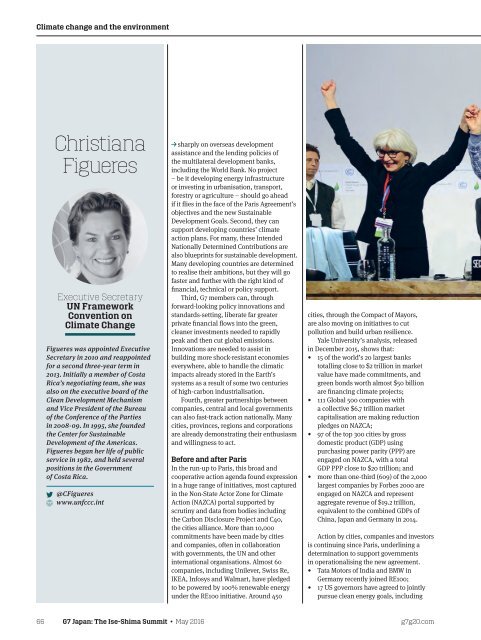G7_JAPAN
You also want an ePaper? Increase the reach of your titles
YUMPU automatically turns print PDFs into web optimized ePapers that Google loves.
Climate change and the environment<br />
Christiana<br />
Figueres<br />
Executive Secretary<br />
UN Framework<br />
Convention on<br />
Climate Change<br />
Figueres was appointed Executive<br />
Secretary in 2010 and reappointed<br />
for a second three-year term in<br />
2013. Initially a member of Costa<br />
Rica’s negotiating team, she was<br />
also on the executive board of the<br />
Clean Development Mechanism<br />
and Vice President of the Bureau<br />
ofthe Conference of the Parties<br />
in 2008-09. In 1995, she founded<br />
the Center for Sustainable<br />
Development of the Americas.<br />
Figueres began her life of public<br />
service in 1982, and held several<br />
positions in the Government<br />
of Costa Rica.<br />
@CFigueres<br />
www.unfccc.int<br />
→ sharply on overseas development<br />
assistance and the lending policies of<br />
the multilateral development banks,<br />
including the World Bank. No project<br />
– be it developing energy infrastructure<br />
or investing in urbanisation, transport,<br />
forestry or agriculture – should go ahead<br />
if it flies in the face of the Paris Agreement’s<br />
objectives and the new Sustainable<br />
Development Goals. Second, they can<br />
support developing countries’ climate<br />
action plans. For many, these Intended<br />
Nationally Determined Contributions are<br />
also blueprints for sustainable development.<br />
Many developing countries are determined<br />
to realise their ambitions, but they will go<br />
faster and further with the right kind of<br />
financial, technical or policy support.<br />
Third, <strong>G7</strong> members can, through<br />
forward-looking policy innovations and<br />
standards-setting, liberate far greater<br />
private financial flows into the green,<br />
cleaner investments needed to rapidly<br />
peak and then cut global emissions.<br />
Innovations are needed to assist in<br />
building more shock-resistant economies<br />
everywhere, able to handle the climatic<br />
impacts already stored in the Earth’s<br />
systems as a result of some two centuries<br />
of high-carbon industrialisation.<br />
Fourth, greater partnerships between<br />
companies, central and local governments<br />
can also fast-track action nationally. Many<br />
cities, provinces, regions and corporations<br />
are already demonstrating their enthusiasm<br />
and willingness to act.<br />
Before and after Paris<br />
In the run-up to Paris, this broad and<br />
cooperative action agenda found expression<br />
in a huge range of initiatives, most captured<br />
in the Non-State Actor Zone for Climate<br />
Action (NAZCA) portal supported by<br />
scrutiny and data from bodies including<br />
the Carbon Disclosure Project and C40,<br />
the cities alliance. More than 10,000<br />
commitments have been made by cities<br />
and companies, often in collaboration<br />
with governments, the UN and other<br />
international organisations. Almost 60<br />
companies, including Unilever, Swiss Re,<br />
IKEA, Infosys and Walmart, have pledged<br />
to be powered by 100% renewable energy<br />
under the RE100 initiative. Around 450<br />
cities, through the Compact of Mayors,<br />
are also moving on initiatives to cut<br />
pollution and build urban resilience.<br />
Yale University’s analysis, released<br />
in December 2015, shows that:<br />
• 15 of the world’s 20 largest banks<br />
totalling close to $2 trillion in market<br />
value have made commitments, and<br />
green bonds worth almost $50 billion<br />
are financing climate projects;<br />
• 111 Global 500 companies with<br />
a collective $6.7 trillion market<br />
capitalisation are making reduction<br />
pledges on NAZCA;<br />
• 97 of the top 300 cities by gross<br />
domestic product (GDP) using<br />
purchasing power parity (PPP) are<br />
engaged on NAZCA, with a total<br />
GDP PPP close to $20 trillion; and<br />
• more than one-third (609) of the 2,000<br />
largest companies by Forbes 2000 are<br />
engaged on NAZCA and represent<br />
aggregate revenue of $19.2 trillion,<br />
equivalent to the combined GDPs of<br />
China, Japan and Germany in 2014.<br />
Action by cities, companies and investors<br />
is continuing since Paris, underlining a<br />
determination to support governments<br />
in operationalising the new agreement.<br />
• Tata Motors of India and BMW in<br />
Germany recently joined RE100;<br />
• 17 US governors have agreed to jointly<br />
pursue clean energy goals, including<br />
66 <strong>G7</strong> Japan: The Ise-Shima Summit • May 2016 g7g20.com
















